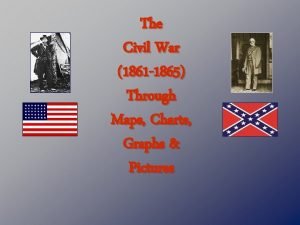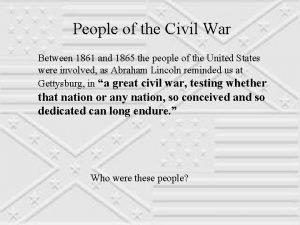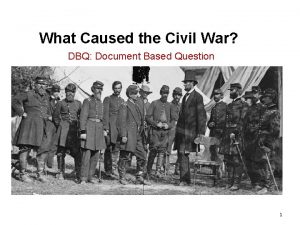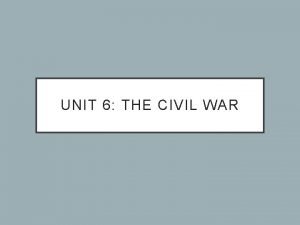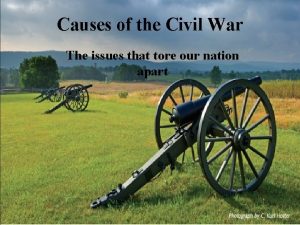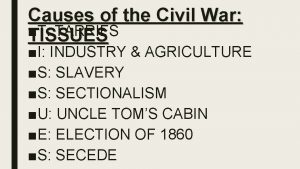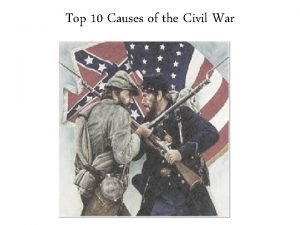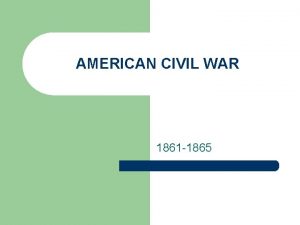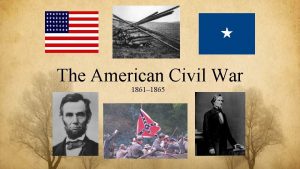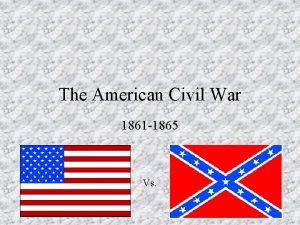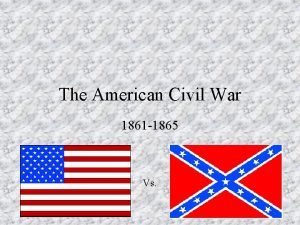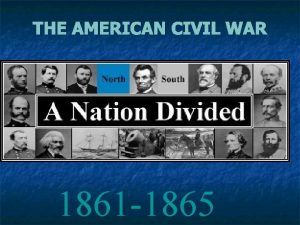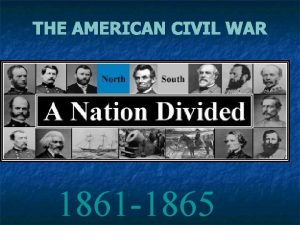CAUSES OF THE AMERICAN CIVIL WAR 1861 1865













- Slides: 13

CAUSES OF THE AMERICAN CIVIL WAR 1861 – 1865 American Slavery, American Freedom Ø What were the most important causes of the American Civil War? Ø How were US politics and society affected as a result of the Civil War? https: //www. youtube. com/watch? v=ro. Nme. OOJCDY [14 minutes ‘Crash Course’ on causes and the 1860 election] • Slavery embedded in the Constitution –foundation of US gov ’t – 3/5 clause And the 1787 Connecticut Compromise (proportional representation in the House, and the Senate) • Slavery and plantation system – rebellions, escapes, resistance • Sectional controversy- North versus South//free versus slave states • Westward Expansion & Territorial Acquisition – Louisiana Purchase, Mexican-American War and its consequences • Issue of whether states would come into the Union as a slave or free state *Should state population be able to vote to decide (popular sovereignty) • Kansas Nebraska Act 1854–undoing the Missouri Compromise of 1820 and leading directly to formation of the Republican Party (from free soil party) in 1854 • The election of Lincoln triggered secession of the 7 (then 11) conferedate states • Approx. 750, 00 died in the war, mostly soldiers (over 2, 5% of the population)



Missouri Compromise 1820 Compromise of 1850 ABOLITIONISTS Harriet Beecher Stowe Uncle Tom’s Cabin 1852 William Lloyd Garrison – The Liberator 1831 1832 New England Anti-Slavery Society Harriet Tubman & Underground Railroad 5, 000 escaped slaves of the 4 million by 1860

Frederick Douglass Abraham Lincoln

CAUSES OF SECTIONAL CONFLICT & AMERICAN CIVIL WAR TIMELINE OF EVENTS Date and Event Significance 1787 US Constitution 3/5 clause Proportional representation compromise 1820 Missouri Compromise Maine free/Missouri slave 1831 Nat Turner slave revolt 55 whites killed in Virgina 1837 Abolitionist Elijah Lovejoy Sectional conflict intensified killed by pro-slavery mob Compromise of 1850 California ; Fugitive Slave Act 1854 Kansas-Nebraska Act 1854 -59 ‘Bleeding Kansas’ Repealed Missouri compromise allowed popular sovereigny 1854 Republican Party Opposed extension of slavery into territories after Mexican – American War 1845 -48 1857 Dred Scott v Sandford African-Americans are not citizens 1860 Lincoln elected Republicans gain power triggering secession

Federal Cavalry in Virginia 1862

U. S. Colored Volunteer Infantry on parade, Camp William Penn, Pennsylvania 1865

Emancipation Day

Reconstruction 13 th Amendment (1865) outlawed slavery in the US (1863 Emancipation Proclamation freed the slaves during the war) Freedmen’s Bureau – attempt to create a free labor system from 1865 was highly problematic; so supported education, legal rights, settle disputes and provide medicine to ex-slaves. But, no land distribution. Instead, sharecropping took hold in cotton and tobacco belt in Virgina and North Carolina, and elsewhere. 1865 -66 Black Codes in south restrict Blacks’ freedom to work 14 th Amendment (1868) granted citizenship to all those born in the US federal gov’t empowered to protect rights of all citizens; Andrew Johnson opposed citizenship for blacks (cf. Dred Scott decision) By 1870, all confederate states readmitted to the union. 1872 KKK ‘Reign of Terror’. Then disappeared after the end of reconstruction in 1876. Resurrected in the post WWI era. 15 Amendment (1870) struggle for the right to vote – a new definition of freedom (but end of slavery did not necessarily mean freedom). Right to vote for men, first time Constitution mentions an exclusive male right 1896 Plessy v. Ferguson – “Separate but Equal’ doctrine upholds racial segregation laws

13 th Amendment Passed by Congress January 31, 1865. Ratified December 6, 1865. The 13 th Amendment changed a portion of Article IV, Section 2 Section 1 Neither slavery nor involuntary servitude, except as a punishment for crime whereof the party shall have been duly convicted, shall exist within the United States, or any place subject to their jurisdiction. Section 2 Congress shall have power to enforce this article by appropriate legislation.

14 th Amendment Passed by Congress June 13, 1866. Ratified July 9, 1868. The 14 th Amendment changed a portion of Article I, Section 2. A portion of the 14 th Amendment was changed by the 26 th Amendment Section 1 All persons born or naturalized in the United States, and subject to the jurisdiction thereof, are citizens of the United States and of the State wherein they reside. No State shall make or enforce any law which shall abridge the privileges or immunities of citizens of the United States; nor shall any State deprive any person of life, liberty, or property, without due process of law; nor deny to any person within its jurisdiction the equal protection of the laws.

15 th Amendment Passed by Congress February 26, 1869. Ratified February 3, 1870 Section 1 The right of citizens of the United States to vote shall not be denied or abridged by the United States or by any State on account of race, color, or previous condition of servitude. Section 2 The Congress shall have the power to enforce this article by appropriate legislation.
 Civil war 1861/1862
Civil war 1861/1862 Civil war 1861/1862
Civil war 1861/1862 What caused the civil war dbq
What caused the civil war dbq Civil war causes
Civil war causes Causes of the civil war jeopardy
Causes of the civil war jeopardy What were the 4 main causes of the civil war
What were the 4 main causes of the civil war Tissues causes of civil war
Tissues causes of civil war What are the 3 main causes of the civil war
What are the 3 main causes of the civil war Causes of the civil war
Causes of the civil war Cause of english civil war
Cause of english civil war Regionalism literature
Regionalism literature Civil war first modern war
Civil war first modern war Toward civil war lesson 3 secession and war
Toward civil war lesson 3 secession and war American civil war battles map
American civil war battles map
